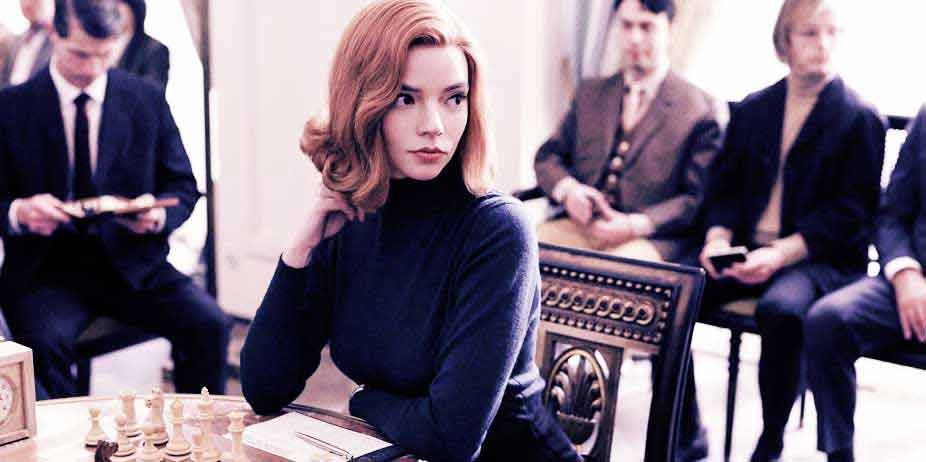
The Queen's Gambit (2020)
Chess becomes riveting in this
seven-part miniseries on Netflix, in which a shy orphan
takes on the demons of her own past and present, and the
greatest Grandmasters around the world.
When her mother
is killed in a car accident, young Beth Harmon (Isla
Johnson) winds up in an orphanage. Befriended by a smart and
sassy black girl named Jolene (Moses Ingram) who encourages
her to save her pills for “nighttime … when they can rev you
up instead of wind you down,” Beth struggles to fit into the
environment. Until one day, sent below stairs to pound chalk
erasers, she meets the quiet janitor Mr. Shaibel (Bill Camp)
and catches sight of his chess board. It’s fascination at
first look, but at first he refuses to teach her.
That’s when she
discovers chess tournaments… and her life changes forever.
Love and loss, heartbreak and triumph, victories and defeats
all await Beth (Anya Taylor-Joy) as she rubs shoulders with
some of the sport’s best players—Benny (Thomas Brodie-Sangster),
Harry Beltik (Harry Melling), and eventually, the Russian
Chessmaster, Vasily Borgov (Marcin Dorocinski).
Though I have
some complaints about this series overall (did it really
need the MA language?), it’s rare that I spend seven hours riveted by a
mini-series. Beth is a likable character in all her
dysfunctional arrogance, a girl who is so good at something,
she doesn’t study it enough and winds up being humiliated
more than once. A girl who has never felt loved, so she
drowns her sorrows in booze and pills. And a girl who has
the courage, finally, to pull herself up out of the hole she
has been digging herself into, and save herself. I enjoyed
her friendship with Jolene, and the sense of community she
eventually finds in her “boys” – even if she wasn’t looking
for a support group.
Though heavily about chess, the series never feels slow, and doesn’t insist
you know much about the game. It speeds through
matches staged by actual Chessmasters, and Anya is such a
compelling actress with such an unusual face, you never lose
interest even when she’s staring down the lens of the
camera. Flashbacks give us peeks about her dysfunctional
childhood with her “crazy” mother, but the series mostly
stays in the present. It has twists, turns, and one episode
that is rather painful to watch, in which we watch Beth
drown her sorrows. It can be a bit obscure at times (is the
man she loves gay or not?), but is a fresh story I haven’t
seen before, about a host of interesting people.
The atmosphere is a perfect throwback
to the 60s, with all the peculiar gowns, loud wallpaper,
saddle shoes, and haircuts that go along with it, and period
music often transitions us between scenes and closes out
each episode. It’s perky and fun. My only other issue is
that it falls into the same bigoted stereotypes about
Christians (as narrow-minded and callous; none of them, for
example, show up to a funeral for their twenty-odd-year
janitor) as many other shows. Despite that, though it
suffers from an excess of bad language and choices, it was
an enjoyable way for me to spend a rainy Friday afternoon.
Sexual Content:
Language:
A dozen abuses of Jesus' name, including one with the f-word in the middle. Lots of f-words. C*cksucker is frequently used as an insult in the first episode. S**t. General profanities, some racial slurs and insults ("cracker").
Violence:
We see the aftermath of a car accident and a body covered with a tarp. A woman falls and hits her head on a table, knocking her unconscious for hours, after she got drunk and took pills.
Other:
Beth drinks a lot. And smokes. And takes "downers" (pills)
that she washes down with alcohol. She persists in getting drunk, high, and
taking them even though everyone warns her if she doesn't stop, she'll be washed
up and/or dead by 21. Eventually, she kicks the habit after going on several
benders. As a child, she breaks into the office to steal those pills and almost
overdoses on them. She also steals a chess magazine from a local store (and pays
for years later). The depiction of Christians is somewhat negative (her teachers
are harsh and seen as judgmental; a friend tells her to take whatever money the
Christians offer her, to get to Russia, but she refuses to speak their "f**king
stupid rhetoric" and thus gives it all back).
